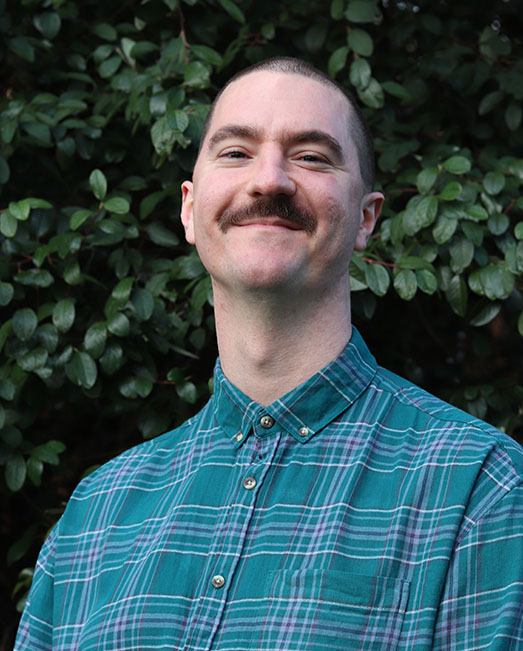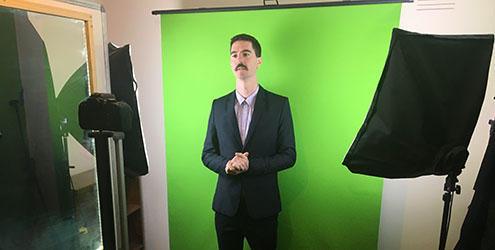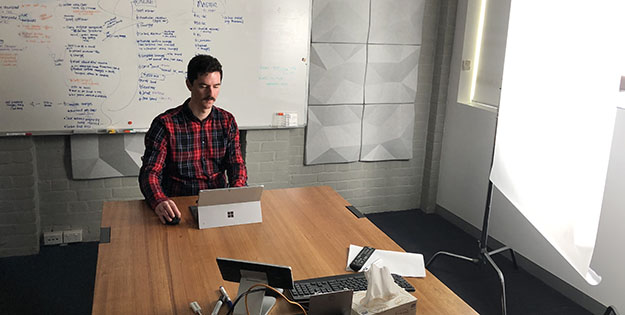Career
Copyright@ Australian Catholic University 1998-2026 | ABN 15 050 192 660 CRICOS registered provider: 00004G | PRV12008
Copyright@ Australian Catholic University 1998-2026 | ABN 15 050 192 660 CRICOS registered provider: 00004G | PRV12008

For English, language and literacy teacher Steven Kolber, the push towards using videos in class started with a PowerPoint slide deck.
“Back in 2016, after teaching the same PowerPoint presentation about poetry metalanguage for the third year in a row, I felt I had refined my instruction to as close to perfect as it would likely get. So, I set my laptop to record. I was able to then get my students to watch that particular video and complete a task at home, which meant we could engage in discussions and commit more time to reading and writing poetry in the classroom,” Steven said.
“This kept me from having to re-teach content year upon year and has reshaped my teaching by freeing up my own time in classes and challenging me to continue to innovate my teaching and instruction as a result.”
Though based in Melbourne where he teaches at Brunswick Secondary College, Steven is passionate about sharing his teaching techniques with the world. His YouTube channel Mr Kolber’s Teaching has almost 2,000 subscribers and he has shared hundreds of hours of lessons and educational practice content online with teachers from all over the globe.
This has seen him named a Top 50 finalist for the Global Teacher Prize 2021.
“This has been really exciting for me, as it means engaging with 49 other amazingly engaged teachers and educators like myself. As well as joining 12 other Australian recipients who have all done amazing work in diverse ways to improve outcomes for their schools and their students,” he said.

Green screen teaching.
Steven has not only won a string of awards, from featuring on The Educator’s 2020 Hot List to being named among The Educator’s 2021 ‘Rising Stars’ for the best Australian teachers under 35 years of age, he is heavily involved in policy development and engagement with the Department of Education.
Steven is also active with the union Education International’s ‘Future World of Work in Education’ expert panel and its work to develop a clearer vision for the future of educational work and practice, in line with the explosion of artificial intelligence use in education and all the possibilities that opens up.
“I would hope that, in the future, online resources would be more accessible to students around the world, rather than each school system, each subject, and each state and country keeping its knowledge hidden behind a range of IT systems, paywalls and filing systems,” he said.
“I hope for a place where knowledge is held in a ‘creative commons’, accessible for all, which would lower the inequity that these systems in part reflect. A place where teachers are free to use, remix, reimagine and create, using the full palette of physical and digital resources that surround them.
“I feel that technology will always have a place within education, but that most of the core tenets of education are as true today as they were during the time of Socrates and Plato. Innovation with technology driven by teachers within schools and systems, rather than from large Ed Tech corporations, has the ongoing and sustainable potential to improve lives through improving accessibility and availability of learning.”
Though he initially chose to study teaching at ACU for pragmatic reasons, 11 years into his career Steven has realised that teaching runs in his family and has enriched his life.
“I was impressed to be able to do a double degree at ACU that combined arts with teaching, including teaching placements along the way,” Steven said. “I was more interested in the arts part of the course initially and worried about having a possible career after completing it, but as the four years passed, I began to realise I was very passionate about teaching.
“I was greatly supported, during coursework, with writing, engaging with the university facilities, and while on teaching and community service placements. ACU instilled in me a real sense of service, respect and continual learning. The expertise among the faculty was superb, they always proved available, passionate and able to support their students.

“While completing my degree, I completed a teaching placement at an aged care facility and at the Shrine of Remembrance; these two opportunities gave me a strong sense of civic duty and an ability to engage with education across different sites.”
After graduating, Steven has continued to engage with the education community. Through his work with Teachers Across Borders Australia, he has organised and facilitated week-long pedagogical workshops for Khmer teachers in rural Cambodian schools and teacher training colleges.
“I believe that by combining my constant striving to improve the conditions of teachers, by presenting to and teaching teachers, and by continuing to teach students every day, that I am able to make a positive difference,” he said.
“My teaching philosophy is to try and recreate what I want to see in the world within my classroom. This is both simple and incredibly complicated, but it means I am constantly striving to improve my teaching as a result. The thing that most consistently challenges my approach is my ongoing reading and writing of research, which means that my understandings and approaches are always being reflected upon and even challenged.”
His advice for others studying education?
“Drink it in: there are not many opportunities in life where you are so free to learn, to study, to experience. The learning you are about to engage in will inform your work, your career and your belief system going forward, so do not take this time lightly.”
Learn more about Steven’s work.
Find out where a teaching degree at ACU can take you.
Copyright@ Australian Catholic University 1998-2026 | ABN 15 050 192 660 CRICOS registered provider: 00004G | PRV12008